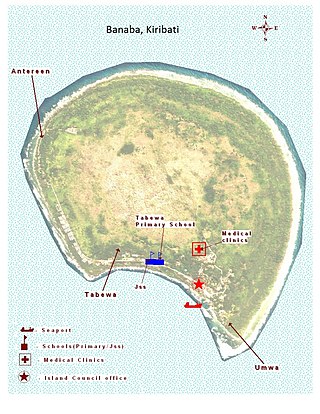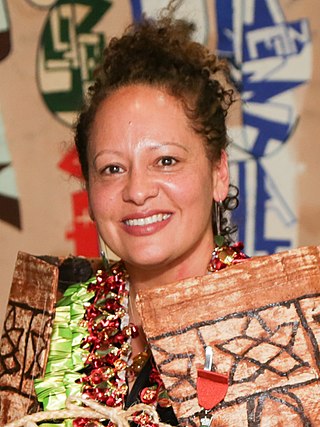
Pacific Islanders, Pasifika, Pasefika, Pacificans, or rarely Pacificers are the peoples of the Pacific Islands. As an ethnic/racial term, it is used to describe the original peoples—inhabitants and diasporas—of any of the three major subregions of Oceania or any other island located in the Pacific Ocean.

Banaba is an island of Kiribati in the Pacific Ocean. A solitary raised coral island west of the Gilbert Island Chain, it is the westernmost point of Kiribati, lying 185 miles (298 km) east of Nauru, which is also its nearest neighbour. It has an area of six square kilometres (2.3 sq mi), and the highest point on the island is also the highest point in Kiribati, at 81 metres (266 ft) in height. Along with Nauru and Makatea, it is one of the important elevated phosphate-rich islands of the Pacific.
Rabi is a volcanic island in northern Fiji. It is an outlier to Taveuni, in the Vanua Levu Group. It covers an area of 66.3 square kilometers, reaching a maximum elevation of 463 meters and has a shoreline of 46.2 kilometers. With a population of around 5,000, Rabi is home to the Banabans who are the indigenous landowners of Ocean Island; the indigenous Fijian community that formerly lived on Rabi was moved to Taveuni after the island was purchased by the British government. The original inhabitants still maintain their links to the island, and still use the Rabi name in national competitions.

Papalii Sia Figiel is an American contemporary Samoan novelist, poet, and painter.

Albert Tuaopepe Wendt is a Samoan poet and writer who lives in New Zealand. He is one of the most influential writers in Oceania. His notable works include Sons for the Return Home, published in 1973, and Leaves of the Banyan Tree, published in 1979. As an academic he has taught at universities in Samoa, Fiji, Hawaii and New Zealand, and from 1988 to 2008 was the professor of New Zealand literature at the University of Auckland.
Epeli Hauʻofa was a Tongan and Fijian writer and anthropologist born of Tongan missionary parents in the Territory of Papua. He lived in Fiji and taught at the University of the South Pacific (USP). He was the founder of the Oceania Centre for Arts at the USP.

Donna Tusiata Avia is a New Zealand poet and children's author. She has been recognised for her work through receiving a 2020 Queen's Birthday Honour and in 2021 her collection The Savage Coloniser won the Mary and Peter Biggs Award for Poetry at the Ockham New Zealand Book Awards. The Savage Coloniser and her previous work Wild Dogs Under My Skirt have been turned into live stage plays presented in a number of locations.
Grace Mera Molisa was a Ni-Vanuatu politician, poet and campaigner for women's equality in politics. The Australian described her as "a vanguard for Melanesian culture and a voice of the Vanuatuans, especially women". She has also been described as one of the Pacific's "leading public intellectuals and activists".
The Festival of Pacific Arts and Culture, Pacific Arts Festival, or FestPAC is a traveling festival hosted every four years, in the same year as the Summer Olympics, by a different country in Oceania (map). It was conceived by the Pacific Community as a means to stem erosion of traditional cultural practices by sharing and exchanging culture at each festival. The major theme of the festival is traditional song and dance.
Emelihter Kihleng is a Micronesian poet. She is the first ever Micronesian to publish a collection of poetry in the English language, and is one of few published Micronesian poets.

Shigeyuki "Yuki" Kihara is an interdisciplinary artist of Japanese and Samoan descent. In 2008, her work was the subject of a solo exhibition at the Metropolitan Museum of Art in New York; it was the first time a New Zealander and the first time a Pacific Islander had a solo show at the institution. Titled Shigeyuki Kihara: Living Photographs, the exhibition opened from 7 October 2008 to 1 February 2009. Kihara's self-portrait photographs in the exhibitions included nudes in poses that portrayed colonial images of Polynesian people as sexual objects. Her exhibition was followed by an acquisition of Kihara's work for the museum's collection.

Karlo Estelle Mila is a New Zealand writer and poet of Tongan, Pālagi and Samoan descent. Her first collection, Dream Fish Floating, received the NZSA Jessie Mackay Award for Best First Book of Poetry in 2006 at the Montana New Zealand Book Awards. She has subsequently published two further poetry collections, A Well Written Body (2008) and Goddess Muscle (2020), the latter of which was longlisted for the Mary and Peter Biggs Award for Poetry.
Anne Kennedy is a New Zealand novelist, poet, and filmwriter.
Mīria George is a New Zealand writer, producer and director of Māori and Cook Island descent. Best known for being the author of award-winning stage plays, George has also written radio, television and poetry, and was one of the film directors of the portmanteau film Vai. In November 2005, she won the Emerging Pacific Artist's Award at the Arts Pasifika Awards. Mīria George was the first Cook Islands artist to receive the Fulbright-Creative New Zealand Pacific Writer's Residency at the University of Hawai'i.

Dr. Alice Aruhe'eta Pollard is a women's rights and peace advocate from the Solomon Islands.
Simone Kaho is a New Zealand poet of Tongan descent.
Tarisi Vunidilo is a Fijian archaeologist and curator who specialises in indigenous museology and heritage management.
Katerina Teaiwa, is a Pacific scholar, artist and teacher of Banaban, I-Kiribati and African American heritage. Teaiwa is well known for her scholarly and artistic work that focuses on the history of British Phosphate Commissioners mining activity in the Pacific during the 1900s and the consequent displacement of Banabans. In 2022, she became the first Indigenous woman from the Pacific to win the Australian University Teacher of the Year award and be promoted to full professor at the Australia National University.
Joana Monolagi is a Fijian artist and masi maker, whose work is in the collection of Auckland Art Gallery. She was awarded the Pacific Heritage Art Award in 2015 at the Arts Pasifika Awards, recognising her work in supporting art and culture, her role as Fijian coordinator for the Pasifika Festival, and her own unique artistic practice. She is part of The Veiqia Project arts collective.
Mikaela Nyman is a Finnish-New Zealand novelist, poet, journalist and editor. After an early career in journalism and non-fiction work, she published her first poetry collection in 2019 and her first novel in 2020. The former resulted in her being nominated for the Nordic Council Literature Prize. Her work has been published in various anthologies and journals, and she was the co-editor of the first anthology of Vanuatu women's writing.








